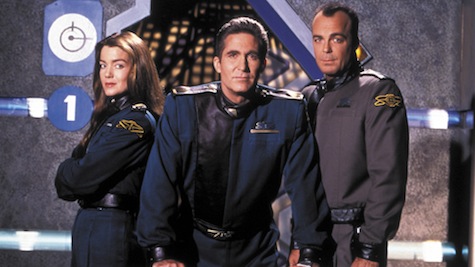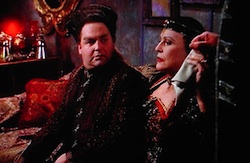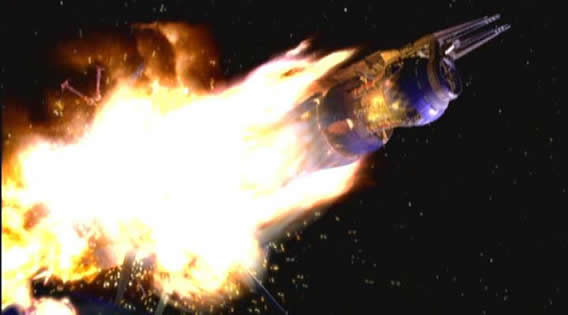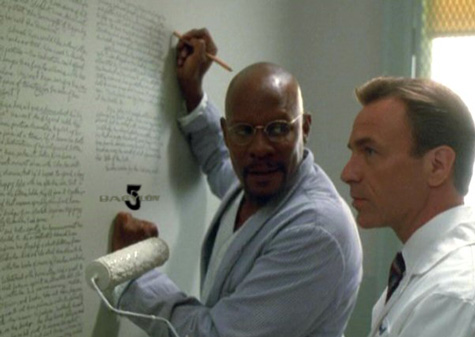This past Friday, February 22nd marked the 20th anniversary of that little space station that almost couldn’t; Babylon 5. Early 2013 also marked the 20th anniversary of another science fiction show centered on a space station: Star Trek: Deep Space Nine. And ever since then, the creators and hardcore fans of both shows have accused one of stealing from the other.
But which came first? The Babylon 5 chicken or the Deep Space Nine egg? Recently, a new piece of information has popped up that inexorably ties together the origins of DS9 and Babylon 5.

Pioneering complex and ongoing story arcs in mainstream science fiction television is probably Babylon 5’s lasting contribution not only to genre fans but to TV in general. However, while it was on the air, B5’s truly herculean accomplishment was simply maintaining its continued existence as a serious outer space science fiction show not called Star Trek.
For years, speculation has existed that Paramount stole aspects of Babylon 5 for the premise of Deep Space Nine, owing to the fact that B5 was pitched to Paramount before being picked up by Warner Bros. And while B5 creator J. Michael Straczynski worried his show would be seen as a “last minute knock-off” of DS9, he soon adopted a “live and let live” attitude toward the whole affair. From JMS news in 1992:
“Were Pillar and Berman aware of B5 at any time? No. Of that I am also confident. The only question in my mind is to what degree did the development people steer them? One scenario is that they did not steer them at ALL…but knowing of B5, and knowing how swell it would be if they could co-opt B5, if Pillar and Berman came up with a space station on their own, they would likely say nothing, even though they might be viewed as being under a moral obligation to say something. Another scenario is that they gave direction to the creative folks without telling them the origin of that direction. There are several ways of dealing with this. One is to launch a major suit with full powers of discovery. The result is that DS9 gets tied up for months, maybe even years in litigation, and maybe the show doesn’t go forward. It also means hundreds of thousands of dollars spent by Warners and me and others pursuing this…not to mention the sense of ill will that will fly back and forth.”
 The two shows eventually came to a reconciliation of sorts. Star Trek’s first lady Majel Barrett Roddenberry guest-starred on Babylon 5 in 1996 and B5’s Bill Mumy showed up in the 7th season of DS9. Further, in 1996 JMS went on record again on his site saying he doubted that Rick Berman and Michael Piller would have actively been “cribbing B5 plotlines,” and went on to defend Voyager producer Jeri Taylor. This particular entry even mentions friendly games of softball between the Babylon 5 cast and the casts of Deep Space Nine and Voyager. (DS9 lost to B5, which lost to Voyager. Why could this crossover not have actually happened on TV!?)
The two shows eventually came to a reconciliation of sorts. Star Trek’s first lady Majel Barrett Roddenberry guest-starred on Babylon 5 in 1996 and B5’s Bill Mumy showed up in the 7th season of DS9. Further, in 1996 JMS went on record again on his site saying he doubted that Rick Berman and Michael Piller would have actively been “cribbing B5 plotlines,” and went on to defend Voyager producer Jeri Taylor. This particular entry even mentions friendly games of softball between the Babylon 5 cast and the casts of Deep Space Nine and Voyager. (DS9 lost to B5, which lost to Voyager. Why could this crossover not have actually happened on TV!?)
It appears that old space graves are being re-opened now, however, due to an interesting comment that emerged from an (excellent) io9 article celebrating the origins of Babylon 5 that was published on February 21st by Jason Shankel. A comment so interesting, in fact, that B5 creator JMS posted it on his own Facebook forum.
A commenter named Steven Hopstaken left the following comment in the io9 article:
I was working at Warner Bros. in the publicity department when Warner Bros. and Paramount were preparing to launch a joint [emphasis mine] network. Warner Bros. already decided to buy Babylon 5 for their adhoc PTEN network (a group of independent stations that agreed to show Warner Bros. shows in prime time.)
Paramount and Warner Bros. both agreed that Deepspace 9 would be the show that would launch the new network and there wouldn’t be room for two “space” shows on the network. I was told they purposely took what they liked from the B5 script and put it in the DS9 script. In fact, there was talk of leaving the B5 script in tact and just setting it the Star Trek universe. I had to keep rewriting press release drafts while they were trying to make the final decision.
But then, suddenly, Paramount decided to launch a new network on their own and screwed Warner Bros. over. That sent Warner Bros. scrambling to create their own network; grabbing up any station not already committed to Paramount and getting WGN to show the WB network on cable.
So Paramount definitely knew about the Babylon 5 script, I don’t know about the DS9 show runners, but I find it hard to believe they didn’t know.
What’s most damning about this statement is the notion that Paramount and Warner Bros. were teaming up to make a television network at a time when both DS9 and B5 were in development, meaning some kind of crossover (perhaps unbeknownst to Rick Berman, Michael Piller, or J. Michael Straczynksi) was bound to occur. Further, the idea that this guy was having to write and rewrite press releases that presumably did or didn’t establish the “space station show” as being set in the Star Trek universe, is totally fascinating. Can you imagine the names this hybrid show might have been called? Star Trek: Babylon Space 5, Star Trek: Babylon Deep, or worse yet, Space Babylon Nine.
JMS’s only reaction to this on his Facebook page so far has been to note that the comment is “interesting,” which seems like the appropriate response. After all, an unverified comment on a website is not exactly proof.
This notion sort of matches up with JMS’s 1992 theory that Berman and Piller didn’t know about Babylon 5, but that the powers-that-be might have manipulated the DS9 showrunners in certain directions. In the end, the two shows ended up being different enough to allow both to survive, and the characters and stories became divergent to the point of making everyone forget there was ever a controversy. And yet, the superficial similarities present at the start of both shows are staggering.
Stalwart DS9 fans will likely continue to maintain it is the best and most dramatic Trek, while Babylon 5 fans will always cite their show as one of the most pure and original “novels for television” ever. I’m a fan of both, but cop to being in the minority of folks who was pro-B5 and anti-DS9 when both were on. Being a Babylon 5 fan in 1993 (when I was REALLY young) felt like being a punk. I loved (and still do love) Star Trek, but even then could recognize its size and power might actually be preventing other cool sci-fi TV from flourishing. As recounted by Jane Killick in the Babylon 5 series guide book Signs and Portents, “The people behind Star Trek didn’t believe it could be done and sat on the idea [Babylon 5] for nine months.”
Star Trek had gone from being the underdog of the 60’s to the schoolyard bully of the 90’s. And while time has probably been more kind to DS9 than B5 (owing I’d say mostly to better production value on the former) B5 might have indeed been a victim of Star Trek’s success, at least early on.

In Babylon 5’s ambitious fourth season finale, “The Deconstruction of Falling Stars” the events of the series are depicted in a flash-forward historical retrospective. First the viewer sees what Earth thinks about the characters at the present time, then 100 years in the future, then 500, and so on. Each subsequent jump creates more bizarre distance, and strange manipulation of the heroic actions of Sheridan, Delenn and the other big characters. From academic trivialization, to military propaganda, to outright myth and legend, the story of Babylon 5 becomes a growing, changing thing.
Perhaps we’ll never fully know how much Paramount plucked from the B5 script for DS9; nor who knew about it. Do I think DS9 was a Babylon 5 rip-off? In the end, like JMS, certainly not. But it may have began its life that way, but there’s not that there’s much we can do about that now. After all, historical accounts of the initial construction of fictional space stations is hardly something most people get too worked up about. But as the future marches on, the deconstruction of these fictional space stations might provide us with some uncomfortable truths about the casual and wanton theft of imagination by powers who don’t possess any imagination themselves.
Ryan Britt is a staff writer for Tor.com.










